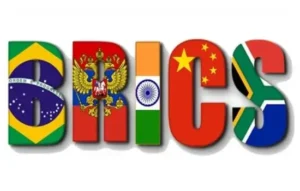President-elect Donald Trump has issued a stern warning to the BRICS nations—Brazil, Russia, India, China, and South Africa—along with their new members, including Iran, Egypt, Ethiopia, and the United Arab Emirates, against efforts to supplant the U.S. dollar in international trade. He threatened to impose 100% tariffs on these countries if they pursue creating or supporting an alternative currency.
Trump’s Ultimatum
In a post on his social media platform, Truth Social, Trump stated:
“We require a commitment from these Countries that they will neither create a new BRICS Currency, nor back any other Currency to replace the mighty U.S. Dollar or, they will face 100% Tariffs, and should expect to say goodbye to selling into the wonderful U.S. Economy.”
This declaration underscores Trump’s intent to maintain the U.S. dollar’s dominance in global markets and signals potential economic repercussions for nations attempting to challenge this status.
BRICS’ De-Dollarization Efforts

The BRICS bloc has been exploring alternatives to reduce reliance on the U.S. dollar, especially following sanctions imposed on Russia in 2022. Discussions have included the possibility of a unified BRICS currency to facilitate trade among member nations. Russian President Vladimir Putin has accused the U.S. of “weaponizing” the dollar, prompting BRICS countries to seek more stable and predictable financial mechanisms.
Global Economic Implications
The U.S. dollar currently accounts for approximately 58% of global foreign exchange reserves, according to the International Monetary Fund. A concerted move by BRICS nations to adopt an alternative currency could significantly impact the dollar’s hegemony, potentially leading to increased volatility in global markets.
Reactions from BRICS Nations
Leaders from the BRICS countries have yet to issue official responses to Trump’s threats. However, the bloc’s ongoing discussions about de-dollarization suggest a strategic interest in diversifying away from the U.S. dollar, regardless of potential U.S. economic sanctions.
Broader Trade Policy Context
Trump’s warning to the BRICS nations aligns with his broader protectionist trade policies. He has also threatened tariffs on Mexico, Canada, and China over issues such as illegal migration and drug trafficking. These actions indicate a willingness to leverage economic tools to achieve foreign policy objectives, despite concerns about potential trade wars and their impact on the global economy.
Conclusion
President-elect Trump’s ultimatum to the BRICS nations reflects a commitment to preserving the U.S. dollar’s central role in global trade. As BRICS countries contemplate financial strategies that could diminish dollar dependence, the international community awaits their response to the potential for heightened economic tensions.
Santosh Kumar is a Professional SEO and Blogger, With the help of this blog he is trying to share top 10 lists, facts, entertainment news from India and all around the world.





